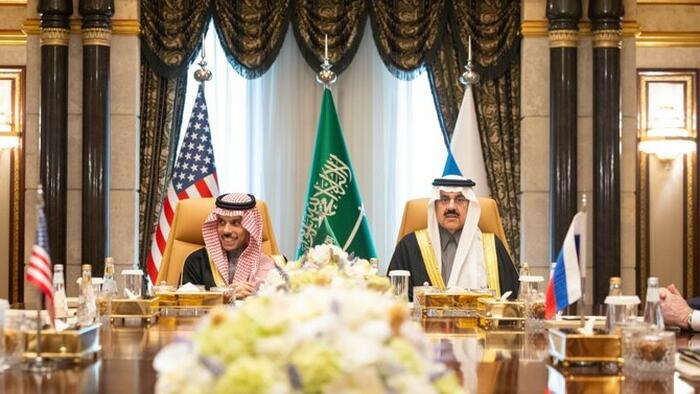


Trump's national security adviser Mike Walz has previewed what will be a main topic of discussion for Monday's next round of talks with Russia in Saudi Arabia. At this point the talks between the US and Ukrainian delegations have concluded (as of Sunday night), and up next is the separate meeting with the Russians, which has begun Monday.
"We're moving closer and we're closer to peace than we ever have been," Walz told CBS' Face the Nation. "And now we have technical teams, actually, with Ukrainians and Russians at the same facility, conducting proximity talks."
That's when he revealed a major new focus of negotiations for the Monday talks. "We now going to talk about a Black Sea maritime ceasefire so that both sides can move grain fuel and start conducting trade again in the Black Sea," Walz described.
Reaching a lasting ceasefire deal would allow both warring countries to "move grain, fuel, and start conducting trade" in the sea again, he said.
Also high on the agenda will be discussions of the front line, the issue of territories, and the achievement and maintenance of sustainable peace. "We’ll talk the line of control… details of verification mechanisms, peace keeping, you know, freezing the lines where they are," Walz noted.
The issue of "broader and permanent peace" and "security guarantees" are also on the table as the diplomatic engagements proceed.
As the talks in Riyadh have reportedly begun Monday, the Russian ruble has continued to strengthen on to the expectation of a peace deal, by 09:30 GMT gaining over 1% against the US dollar in the over-the-counter market.
Meanwhile, Ukraine's president Volodymyr Zelensky has condemned the continued aerial attacks on Ukraine. Overnight Ukraine's military says it shot down nearly 60 inbound Russian drones. Both sides say they've agreed to a US-brokered pause on attacks against energy infrastructure - both other attacks have persisted.
Zelensky called on allies put more pressure on Russia "to stop this terror". He said in a fresh televised statement that "since March 11, a proposal for an unconditional ceasefire has been on the table, and these attacks could have already stopped. But it is Russia that continues all this."
"Our team is working in a fully constructive manner, and the discussion is quite useful. The work of the delegations continues," Zelensky said in reference to the Sunday Riyadh meeting with the US delegation.
"But no matter what we’re discussing with our partners right now, Putin must be pushed to issue a real order to stop the strikes, because the one who brought this war must be the one to take it back," he added.
Al Jazeera has the following brief backgrounder on the national security officials leading the Russian delegation for Monday's meeting with the US in Riyadh:
Sergei Beseda
The 70-year-old is an adviser to FSB chief Alexander Bortnikov.
From 2009 to last year, he was heading the FSB’s 5th service, which runs agents in former Soviet countries. Some experts believe he was closely involved in intelligence preparations for Russia’s full-scale invasion of Ukraine in 2022.
According to Reuters, Beseda’s position appeared precarious after Ukraine fought back much more strongly than expected and Russia’s initial assault on Kyiv was beaten back, but he remained in his post.
Ex-US Ambassador John Sullivan wrote in his memoir that Beseda also took part in negotiations with the US in 2021 on exchanging prisoners held in each other’s prisons.
Grigory Karasin
The 75-year-old is a former long-serving diplomat whose past posts include deputy foreign minister and ambassador to the UK.
He is now a member of the Federation Council, the upper house of Russia’s parliament, and chairs its international affairs committee.
Both he and Beseda have been placed under Western sanctions.
* * *
Below are more developing Monday geopolitical headlines via Newsquawk:
Middle East
Ukraine
Other
